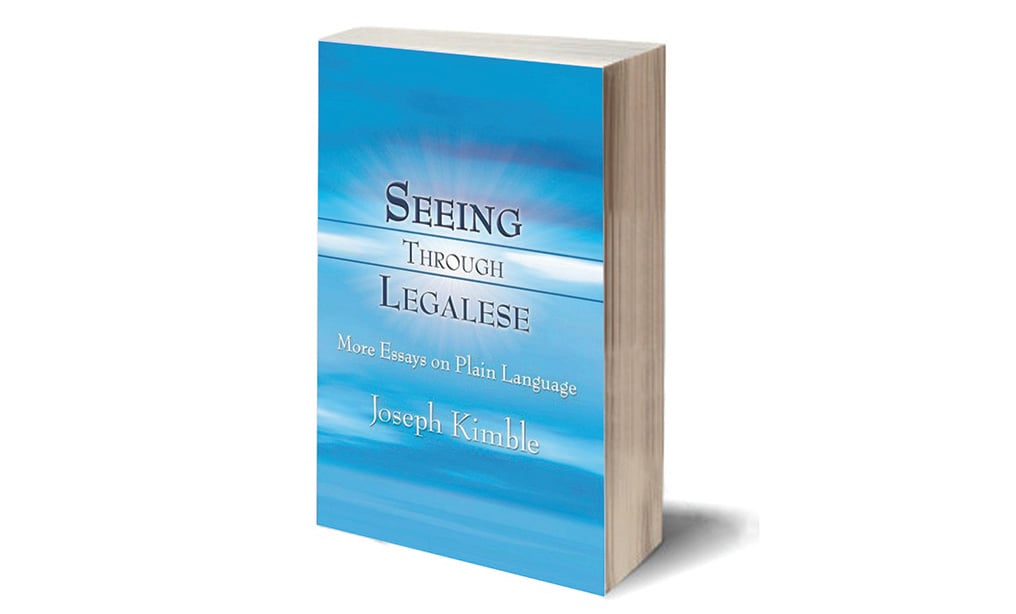Why Lawyers Need to Learn to Write Clearly
Many factors cause lawyers to write turgidly, including a limited knowledge of how to write in plain English and a belief that readers prefer dense writing to simple, interesting, easy-to-understand writing.
May 01, 2018 at 11:52 AM
7 minute read

Seeing Through Legalese: More Essays on Plain Language by Joseph KimbleCarolina Academic Press, Durham, North Carolina, 2017, 273 pages, $25.00
Lawyers are America's best-paid writers. All day long, they write for a living, composing memos, briefs, contracts, letters and emails. Writing is critical to the legal profession. Good writing helps us understand agreements, arguments, concepts and rules. Good writing entertains, informs and persuades. Good writing affects the administration of justice. Conversely, bad writing bores, complicates, confuses and misleads ─ and goes unread. A lawyer's arrangement and choice of words will make the difference between a client's winning or losing, determine how to interpret a contract and ascertain whether someone has followed or broken the law.
Clear legal writing is not always the norm. Readability is important to all readers but less so to some writers. Writing precisely is tiresome and time-consuming. To avoid the hard work of thinking and writing for the reader ─ the only person who counts in writing ─ lawyers use complex terminology and sentence structure. But jargon and legalese detract from reader comprehension and writer credibility.
Many factors cause lawyers to write turgidly, including a limited knowledge of how to write in plain English and a belief that readers prefer dense writing to simple, interesting, easy-to-understand writing. The legal profession has not always trained lawyers to write lucidly. Most lawyers have memories of law school, reading cases written with fanciful, vague verbiage and opaque, impenetrable organization. These models advance the mistaken view that legal writing should be artful rather than helpful to readers who read to make a decision and who need and want only what will lead to a reasoned, correct decision.
Lawyers have many tools to help them write clearly. They can write in everyday Anglo-Saxon English. They can eliminate ornamental, foreign and long words. They can prefer short sentences to long ones, use topic sentences at the beginning of paragraphs and state their point at the beginning of their discussion. They can explain things only once and put related matters all in one place. They can write concretely to avoid conclusory statements. They can rid their writing of adjectives, adverbs, cowardly qualifiers and overblown intensifiers. They can write concisely ― eliminating unnecessary, outdated and repetitious words and phrases ― and precisely. That means placing modifiers correctly and writing in the active voice, without negatives, complex conditionals, nominalizations (preferring nouns to verbs), or metadiscourse (writing about your writing).
Joseph Kimble, a leading advocate of the plain-language movement, has just published a book suggesting these techniques. His book, Seeing Through Legalese: More Essays on Plain Language, tells readers how to transform writing from convoluted and obscure to simple and concise. Kimble, the Distinguished Professor Emeritus at Western Michigan University Cooley Law School, has already published dozens of articles and two books on legal writing: Lifting the Fog of Legalese: Essays on Plain Language and Writing for Dollars, Writing to Please: The Case for Plain Language in Business, Government and Law. He has served as drafting consultant to the Committee on Rules of Practice and Procedure of the Judicial Conference of the United States and led the redrafting of the Federal Rules of Civil Procedure and the Federal Rules of Evidence. He has won many awards for his writing and as a leading plain-language advocate and educator.
Seeing Through Legalese, Kimble's latest and most definitive book, is particularly candid and cogent about legal writing. It is a must read for law students, practitioners and all those who wants to improve their legal writing or to learn new and better ways to teach legal writing to law students and colleagues. Kimble notes the complications that result from unclear or complex language and gives substantive tips on how to write clearly and effectively. Apart from being extremely helpful, Seeing Through Legalese is an easy read. Kimble follows his own advice by using plain language throughout his book.
Kimble identifies two main reasons for the professional deficiency in legal writing. The first is the law schools' occasional neglect to teach students proper drafting. The second is the limited models to which lawyers can turn. He attributes this deficiency to the “dense, verbose, antiquated drafting” techniques formbooks offer. Through an assortment of examples and comprehensive instructions, Kimble's new book is meant to cure this deficiency.
Seeing Through Legalese compiles different essays, broken up into three parts. In part one, Kimble rejects legalese and offers humorous examples to show why plain legal writing is imperative. He also gives personal accounts of some lessons he learned from his contributions redrafting the Federal Rules of Civil Procedure and Federal Rules of Evidence. He offers side-by-side examples of the original rules and the redrafted rules. Kimble uses these examples to teach legal writers to transform their writing from confusing to clear. His examples show the need for concision and plain language. Kimble also shows how structuring words in a logical and sequential format will significantly affect a reader's ability to understand. He pushes for the eradication of “shall” in legal writing because of its ambiguity and gives four ways to break up long sentences. To conclude part one, he debunks some of the prevailing myths against writing.
In part two, Kimble gives practical advice on how to write with clarity and to format citations favorably for the reader. He describes how he became a passionate defender of plain language and refutes some common objections to its use in legal writing. One objection is the belief that clients and supervisors expect legalese, despite the overwhelming evidence that readers disrespect those who use it. Kimble also gives pragmatic tips for students writing in journals, such as what to do with footnotes, how to assemble sentences and how to persuade. He dedicates one essay to how to edit resourcefully and another to telling employers how to test a job candidate's writing skills.
Part three compiles interviews and remarks from his acceptance of awards for his writings and influence in the legal profession. In these interviews and remarks, Kimble articulates his passion for plain English and his lifelong dedication to eradicating legaldygook. He clarifies some of his own critiques against legal writing he identifies as poor examples, such as jury instructions and explains why clarity in legal writing is essential. He gives law students advice on actions they can take to avoid legalese and offers suggestions for books and essays on legal writing.
Seeing Through Legalese: More Essays on Plain Language is an indispensable book for any lawyer or legal professional who wants to write better. Kimble offers funny anecdotes of triumph and dismay in his fight for legal-writing clarity. His examples and advice make learning to write entertaining and painless. As Kimble explains, “[i]t's not dumbing down to write clearly for your reader in legal, government, and business documents. It takes great skill, and readers love it.”
Gerald Lebovits is an acting Supreme Court justice in New York County and an adjunct at Columbia, Fordham and NYU law schools. Cynthia Moore is Justice Lebovits's judicial fellow and a rising 3L at Syracuse University College of Law, where she serves on the Law Review.
This content has been archived. It is available through our partners, LexisNexis® and Bloomberg Law.
To view this content, please continue to their sites.
Not a Lexis Subscriber?
Subscribe Now
Not a Bloomberg Law Subscriber?
Subscribe Now
NOT FOR REPRINT
© 2025 ALM Global, LLC, All Rights Reserved. Request academic re-use from www.copyright.com. All other uses, submit a request to [email protected]. For more information visit Asset & Logo Licensing.
You Might Like
View All
The Golden Rule Revisited: Treating Clients How They Want To Be Treated

'Everyday Hustle': A Criminal Defense Attorney's Tips for Running a Solo Practice
6 minute readTrending Stories
- 1Uber Files RICO Suit Against Plaintiff-Side Firms Alleging Fraudulent Injury Claims
- 2The Law Firm Disrupted: Scrutinizing the Elephant More Than the Mouse
- 3Inherent Diminished Value Damages Unavailable to 3rd-Party Claimants, Court Says
- 4Pa. Defense Firm Sued by Client Over Ex-Eagles Player's $43.5M Med Mal Win
- 5Losses Mount at Morris Manning, but Departing Ex-Chair Stays Bullish About His Old Firm's Future
Who Got The Work
J. Brugh Lower of Gibbons has entered an appearance for industrial equipment supplier Devco Corporation in a pending trademark infringement lawsuit. The suit, accusing the defendant of selling knock-off Graco products, was filed Dec. 18 in New Jersey District Court by Rivkin Radler on behalf of Graco Inc. and Graco Minnesota. The case, assigned to U.S. District Judge Zahid N. Quraishi, is 3:24-cv-11294, Graco Inc. et al v. Devco Corporation.
Who Got The Work
Rebecca Maller-Stein and Kent A. Yalowitz of Arnold & Porter Kaye Scholer have entered their appearances for Hanaco Venture Capital and its executives, Lior Prosor and David Frankel, in a pending securities lawsuit. The action, filed on Dec. 24 in New York Southern District Court by Zell, Aron & Co. on behalf of Goldeneye Advisors, accuses the defendants of negligently and fraudulently managing the plaintiff's $1 million investment. The case, assigned to U.S. District Judge Vernon S. Broderick, is 1:24-cv-09918, Goldeneye Advisors, LLC v. Hanaco Venture Capital, Ltd. et al.
Who Got The Work
Attorneys from A&O Shearman has stepped in as defense counsel for Toronto-Dominion Bank and other defendants in a pending securities class action. The suit, filed Dec. 11 in New York Southern District Court by Bleichmar Fonti & Auld, accuses the defendants of concealing the bank's 'pervasive' deficiencies in regards to its compliance with the Bank Secrecy Act and the quality of its anti-money laundering controls. The case, assigned to U.S. District Judge Arun Subramanian, is 1:24-cv-09445, Gonzalez v. The Toronto-Dominion Bank et al.
Who Got The Work
Crown Castle International, a Pennsylvania company providing shared communications infrastructure, has turned to Luke D. Wolf of Gordon Rees Scully Mansukhani to fend off a pending breach-of-contract lawsuit. The court action, filed Nov. 25 in Michigan Eastern District Court by Hooper Hathaway PC on behalf of The Town Residences LLC, accuses Crown Castle of failing to transfer approximately $30,000 in utility payments from T-Mobile in breach of a roof-top lease and assignment agreement. The case, assigned to U.S. District Judge Susan K. Declercq, is 2:24-cv-13131, The Town Residences LLC v. T-Mobile US, Inc. et al.
Who Got The Work
Wilfred P. Coronato and Daniel M. Schwartz of McCarter & English have stepped in as defense counsel to Electrolux Home Products Inc. in a pending product liability lawsuit. The court action, filed Nov. 26 in New York Eastern District Court by Poulos Lopiccolo PC and Nagel Rice LLP on behalf of David Stern, alleges that the defendant's refrigerators’ drawers and shelving repeatedly break and fall apart within months after purchase. The case, assigned to U.S. District Judge Joan M. Azrack, is 2:24-cv-08204, Stern v. Electrolux Home Products, Inc.
Featured Firms
Law Offices of Gary Martin Hays & Associates, P.C.
(470) 294-1674
Law Offices of Mark E. Salomone
(857) 444-6468
Smith & Hassler
(713) 739-1250








